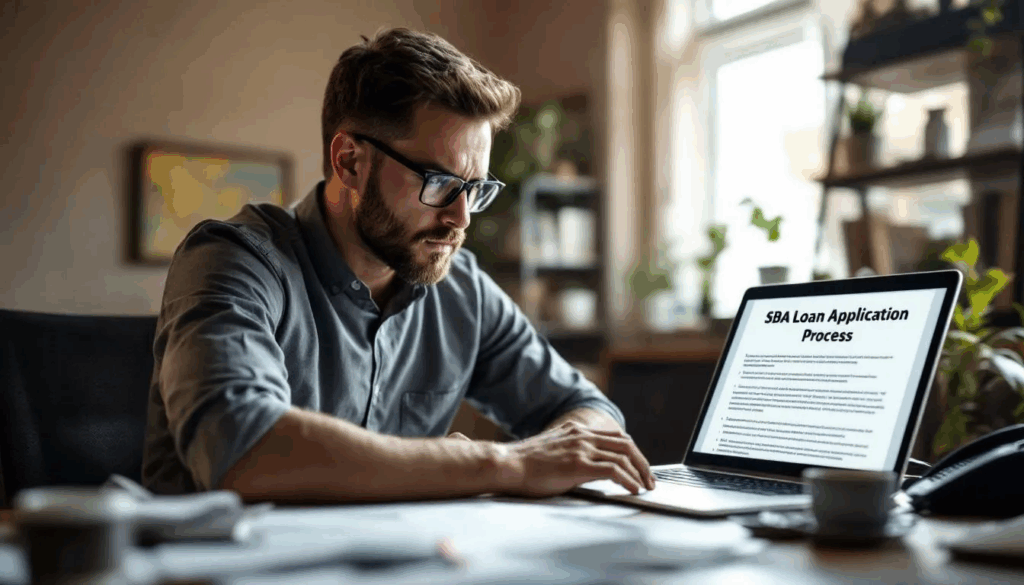What Are SBA Loans?
Small Business Administration (SBA) loans are government-backed financing solutions designed to support small businesses that may not qualify for traditional bank loans. The SBA doesn’t directly lend the money; instead, it works with approved lenders by guaranteeing a portion of the loan. This guarantee reduces the risk for lenders, allowing them to offer more favorable terms to small business owners. SBA loans provide small businesses with funding ranging from $500 to $5.5 million.
There are several types of SBA loans, each suited for different business needs. The most common is the SBA 7(a) loan, which can be used for working capital, equipment purchases, debt refinancing, and more. The maximum loan amount for the SBA 7(a) program is $5 million. The SBA guarantees the funds for SBA 7(a) loans up to 85% in some cases, making it one of the most flexible and accessible small business financing options.
Another option is the SBA microloan program. SBA microloans offer loans up to $50,000 for eligible borrowers. These loans are designed for startups, sole proprietors, and underserved businesses that need smaller amounts of funding and may not have established credit or collateral.
SBA loan funds must be used for business purposes. Overall, SBA loans are a valuable tool for business owners seeking long-term, low-interest funding with manageable repayment terms and flexible usage.
What are the benefits of waiting longer for SBA loans?
You may be wondering what advantages an SBA loan offers over other forms of business funding, such as a merchant cash advance, equipment financing, or bad credit business loans, especially if you have to wait a long time for approval. Though the low interest rates that SBA loans charge are at the forefront of their selling point, you’ll also find a lot to be impressed with in terms of what you don’t have to sacrifice equity in your business.
A significant benefit of the program is that the loans are long-term in nature. Loan repayment terms vary, with some extending more than two decades (for non-real estate loans). Additionally, the Small Business Administration sets caps on the interest that business lending borrowers are required to repay. Combining both the cap and longer-term results in a lower interest rate for businesses experiencing cash flow issues.
The process for obtaining an SBA loan can sometimes be somewhat lengthy, but we have a few tips that may help.
What Are the Drawbacks of Waiting Longer for SBA Loans?
While SBA loans offer excellent rates and favorable terms, waiting for approval can put your business at risk if you need capital fast. Business owners often face time-sensitive financial needs such as:
-
Emergency equipment repairs or replacements.
-
Covering payroll when cash flow stalls.
-
Seizing limited-time inventory or investment opportunities.
-
Addressing urgent maintenance or renovations.
-
Responding quickly to seasonal demand or market shifts.
The SBA loan process can take several weeks—or even months—to finalize, which is problematic for entrepreneurs who need to act fast. During this waiting period, you could miss out on opportunities or face additional costs due to delayed funding. In some cases, a faster (though more expensive) loan might be the better option depending on your circumstances.
Waiting Longer for an SBA Loan: Pros & Cons
Pros:
-
✅ Lower interest rates compared to most alternative financing options.
-
✅ Longer repayment terms—up to 25 years in some cases.
-
✅ Higher borrowing limits for eligible businesses.
-
✅ Doesn’t require you to give up equity in your business.
-
✅ SBA guarantees reduce risk for lenders, improving your chances of approval.
Cons:
-
⏳ The approval process can take 30 to 180 days.
-
🚨 Not ideal for emergency expenses or time-sensitive opportunities.
-
📋 Requires extensive documentation and financial paperwork.
-
🧾 May involve multiple rounds of lender and SBA approval.
What paperwork do I need to gather for my SBA loan application?
Obtaining an SBA loan can be a time-consuming process. Gathering the needed documents into a complete application package is one way to save some time during the SBA loan application process.
The SBA loan application process typically takes 45 days or more, during which a business owner will spend the majority of their time gathering paperwork for the lender. The good news is that the SBA has a checklist that makes this much easier and ensures business owners are as prepared as possible before beginning the SBA loan process. The SBA requires documentation about both business and personal finances.
To apply for an SBA loan, businesses must generally operate for profit and meet the SBA’s size and industry standards. Applicants are required to submit income tax returns and a resume as part of the SBA loan application. Bank account statements and pay stubs are necessary documents for an SBA loan application. Lenders may require additional documents, such as proof of insurance, during the closing process of an SBA loan.
The SBA Loan paperwork checklist includes, but is not limited to:
Borrower Information Form (SBA Form 1919)
Personal Background and Financial Statement
-
Statement of Personal History: SBA Form 912
-
Personal Financial Statement: SBA Form 413 (Not required, but available for lenders to use)
Business Financial Statement
-
Year-End Profit and Loss (P&L) Statement for the last three years
-
Year-End Balance Sheet for the previous three years, including a detailed debt schedule
-
Reconciliation of Net Worth
-
Interim Balance Sheet
-
Interim Profit & Loss Statements
-
Projected Financial Statements that include month-to-month cash flow and financial projections for at least a one-year period.
Business Licenses & Certificates
Loan Application History
Business Tax Returns
Resumes
Business Overview and History
Business Lease
Additional Documents (If Purchasing an Existing Business)
-
Current balance sheet and P&L statement of the business to be purchased
-
The previous three years’ federal income tax returns of the business to be purchased
-
Proposed Bill of Sale including Terms of Sale
-
Asking price with the schedule of inventory, machinery and equipment, furniture, and fixtures
-
Franchise, jobber, or licensing agreements
-
Proof of equity injection
-
Additional SBA forms may be required based on the specific use of proceeds or fees paid by the applicant to a loan broker or agent.
-
In some cases, depending on the size of the loan, the bank may require a business plan to gain a better understanding of your plans for the loan proceeds and the resources you’ll be putting in place to repay the loan.
How to Apply for an SBA Business Loan:
United Capital Source can assist you in applying to an SBA-approved lender by following these steps.
Step 1: Ensure You Qualify
You’ll need a credit score between 650 and 700, as well as a healthy and consistent cash flow. How you intend to use the money also plays a significant role. You’ll need a detailed plan of how the funds will help you invest in and grow the business.
Step 2: Gather Your Documents
Be prepared to provide:
-
Driver’s License
-
Voided Business Check (for business bank account information)
-
Bank Statements
-
Credit Report/Statement of Personal Credit History
-
Credit Card Processing Statements
-
Personal Tax Returns – 3 Years
-
Business Tax Returns – 3 Years
-
Business Plan (Not in all cases)
-
Personal Financial Statement
-
List of Real Estate Owned or Business Leases, if applicable.
-
Debt Schedule/Loan/Rent/Lease Documentation
-
Deeds/Title/Ownership documentation for any collateral/Security
-
Current Profit & Loss Statements and Balance Sheet Year-to-Date
-
A/R and A/P Reports
-
United Capital Source 1 Page Application
Step 3: Fill Out the Application
You can begin the application process by calling us or filling out our one-page online application. Either way, you’ll be asked to enter the information from the previous section along with your desired funding amount.
Step 4: Speak to a Representative
Once you apply, a representative will contact you to explain the repayment structure, rates, and terms of your available options. This way, you won’t have to worry about any surprises or hidden fees during repayment.
Step 5: Receive Approval
SBA Loans through our network generally take 3-5 weeks to process. Once your file is approved and closed (45-90 days), the funds should appear in your bank account within a few business days.
So really, how long does it take to get an SBA loan?
Processing times for business loans can vary from lender to lender, and the reasons for this are many. Closing for an SBA loan typically takes seven to 14 days, but can take as long as 90 days.
SBA loans require a little more processing time than other types of traditional loans, as lenders must examine the details of the financing purpose. Underwriting typically takes between 10 and 14 days or as long as 60 to 90 days. Undisclosed financial issues can cause delays during the underwriting process.
If your loan is approved, your SBA lender will begin to prepare your loan documents within 10-21 days. As you move closer to closing your small business loan, there will be more documents for you to fill out as part of the SBA loan closing process. From there, it takes between one and two weeks for the money to be deposited into your account after the processor finishes their work. Therefore, in total, it could take up to six or more for you to have access to those funds from start to finish.
Banks in the SBA’s Preferred Lenders Program typically process loan applications faster than non-preferred lenders.
What is an SBA 7 (a) loan & how long does it take to get approved?
The most popular SBA loan product is the standard 7(a) loan, which can be used for working capital, acquiring equipment, refinancing other business debt, and various other purposes. Though its flexibility in use makes it very versatile, it cannot exceed a $5 million loan amount.
The SBA 7(a) loan program is always in high demand, so there will be a long wait. The timing for processing from start to finish will depend on you and your lender, but it typically takes about two to three months.
What is an SBA Express loan & how long does it take for approval?
Waiting too long for a traditional SBA loan may not be feasible, depending on your situation. However, if you need an emergency loan, the SBA Express Program may be a worthwhile option to consider. SBA Express loans offer faster processing times compared to other SBA loans. SBA Express loans can be approved within 36 hours for up to $500,000.
The lender can approve SBA Express loans without involving the SBA. The average turnaround time for SBA Express loans generally takes 36 hours. And that doesn’t include the time it takes to get approval from your lender, which may add a few weeks. It typically takes 60 to 90 days for lenders to process an SBA loan application; however, your overall timeline will be shorter, ranging from 30 to 60 days, if you opt for the express loan route.
What is an SBA 504 loan & how long does it take for approval?
We’re going to talk about the Small Business Administration’s 504 loan program. If you aren’t familiar with it already, it helps small businesses get loans to finance the acquisition of fixed assets for expansion and modernization. Before the lender can process an SBA 504 loan, it must first go through a Certified Development Company, a step that throws off the typical processing timeline.
Because SBA loans require approval from both the SBA and the Certified Development Companies, the process can take some time to complete. As a result, the time it will take for you to receive your SBA 504/CDC loan approval varies. On average, you can expect to wait about a month and a half after you submit your application for financing. SBA loans are typically processed fairly quickly by lenders, but the processing times can be as long as six months for this business financing program.
What is an SBA microloan & how long does it take for approval?
The SBA offers a microloan program, which, as its name implies, is designed for smaller amounts. It caps at $50,000. Working capital microloans require less documentation compared to business acquisition loans.
While these loans may not provide the same financing size as larger loans, the processing time is usually faster and often doesn’t require a business plan. In as little as a month, you can have the funds in your account. In some cases, though, it can take up to three months.
Although SBA microloans are beneficial for small businesses, they can be less straightforward than larger loans. That’s because the SBA initially lends to an intermediary lender or bank at a discount. Then, the intermediary lender or bank will have the authority to issue loans to the business.
If you’re an entrepreneur with less-than-perfect credit, the microloan could be the right product for you. Among the different types of SBA loans, microloans are popular among minority women entrepreneurs. A consideration regarding microloans is their 10-year repayment term.
SBA Loan Alternatives:
Traditional bank loans often require extensive documentation, similar to that of the SBA. Nonprofit community-based lenders offer microloans up to $50,000 for small businesses. Some online lenders provide same-day approval for business loans.
How Long Does it Take to Get an SBA Loan? – Final Thoughts
As a small business owner, it is important to maintain your patience when pursuing an SBA loan. SBA loans usually take 30 to 90 days from application to funding.
However, you don’t have to wait for the SBA loan approval process. These days, many lenders have fast funding options available to business owners that weren’t available 5-10 years ago.
United Capital Source can assist with all types of funding. Whether you’re seeking an SBA loan, a small business line of credit, or other types of working capital loans, we can offer a complimentary consultation and assist you in obtaining a loan approval for specific programs within 24 hours, with funds in your bank account within a few business days.
Whatever your business funding needs, United Capital Source has the lenders and the resources to make it happen!














